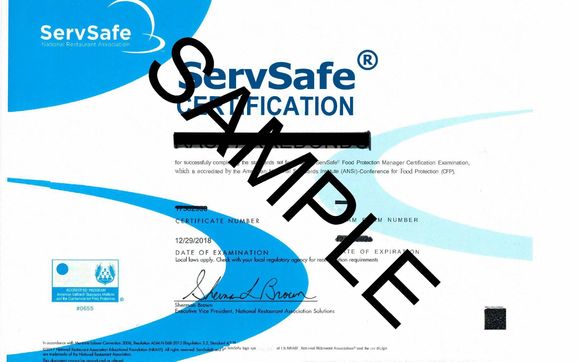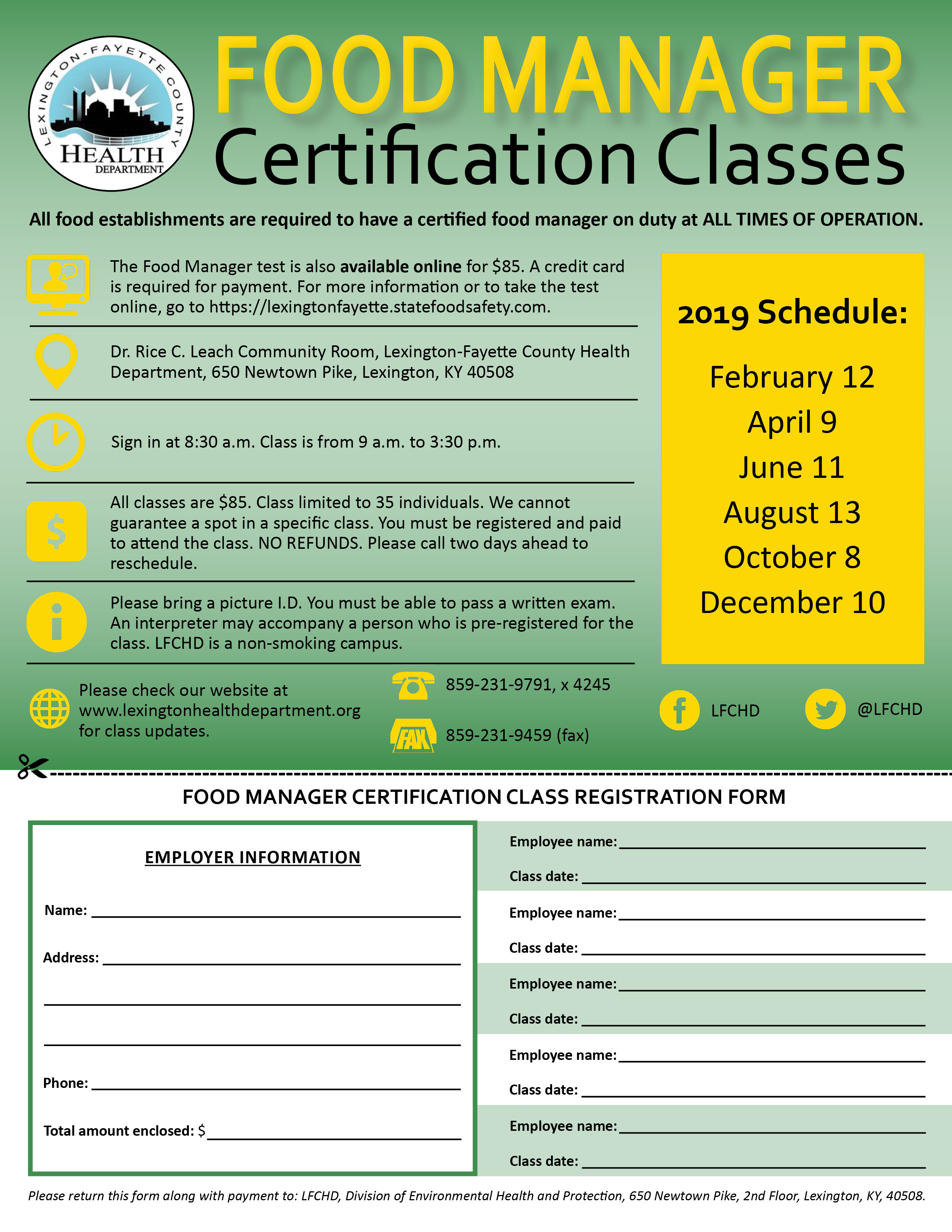The Importance of Safe Serve Manager Certification for Dining Establishment Leadership
The Importance of Safe Serve Manager Certification for Dining Establishment Leadership
Blog Article
Expert Training for Food Manager Accreditation Made Simple
The significance of food supervisor accreditation can not be underrated, especially in a period where food safety is vital. Professional training programs have advanced to simplify the certification procedure, giving necessary understanding and useful abilities necessary for reliable food administration. These programs cover crucial topics, from foodborne ailment avoidance to compliance with wellness regulations. However, the true worth of this training expands beyond simple accreditation; it has profound ramifications for job innovation and public wellness. Recognizing just how these components interconnect may reveal opportunities that are frequently overlooked.
Importance of Food Supervisor Certification
The significance of Food Supervisor Qualification can not be overstated in today's food service market. This accreditation symbolizes that food managers have the crucial understanding and abilities to guarantee food safety, keep health requirements, and support regulatory conformity. In a period where foodborne illnesses can have serious effects, the role of a licensed food supervisor comes to be important in guarding public wellness.
Food Supervisor Certification not just outfits individuals with the expertise to minimize and determine food safety and security dangers but also boosts the reliability of the establishment. Clients are progressively critical; they seek assurance that their eating experience is hygienic and risk-free. Certification works as a mark of professionalism and reliability that can bring in and keep customers.
Additionally, neighborhood territories and several states mandate that establishments use qualified food managers to follow health and wellness guidelines. This demand highlights the qualification's significance in avoiding potential legal implications and fines. Furthermore, a licensed food supervisor can lead team training, cultivating a society of safety and liability within the office. Investing in Food Manager Qualification is an investment in top quality, safety, and the overall success of food service procedures.
Overview of Expert Training Programs
Expert training programs for food manager certification are designed to provide comprehensive education on food security techniques, regulative conformity, and danger administration. These programs aim to equip food service specialists with the expertise and abilities needed to make sure risk-free food handling and preparation in various setups, consisting of dining establishments, catering services, and institutional food procedures.
Commonly, specialist training programs include both theoretical and practical components, allowing individuals to engage with real-world scenarios. The educational program commonly includes essential subjects such as foodborne health problems, proper food storage space methods, hygiene protocols, and staff member training methods. Additionally, these programs are frequently upgraded to align with the current market standards and laws, making sure that participants get existing and relevant details.
Many programs use flexible shipment approaches, including in-person courses, on-line programs, or a hybrid strategy, catering to different understanding preferences and routines. Upon successful completion, participants generally receive accreditation, which is often acknowledged by neighborhood health departments and regulative firms, enhancing their profession potential customers within the food solution industry. In general, professional training programs play a critical role in promoting a culture of food safety and security and conformity amongst food supervisors and staff.
Key Topics Covered in Training
Food safety and security is a critical focus in food manager accreditation training, including a selection of crucial Visit This Link topics that ensure participants are well-equipped to deal with food safely. One of the main subjects covered is the value of personal health, which consists of correct handwashing strategies and the value of maintaining sanitation in cooking locations.
In addition, the training addresses foodborne ailments, describing the different microorganisms that can infect food and the signs and symptoms connected with these diseases. Participants find out about the conditions that promote microbial development, which is crucial for stopping break outs.
Temperature control is another key subject, stressing the risk-free cooking, cooling, and storage space temperature levels required to minimize threats. The training additionally covers cross-contamination prevention approaches, making certain that raw and prepared foods are dealt with appropriately to stay clear of dangerous communications.
Additionally, food safety guidelines and guidelines, such as those established forth by the FDA and local health and wellness departments, are gone over to provide a detailed understanding of compliance demands. Last but not least, effective parasite control measures are taken a look at to protect food establishments from problems that can compromise security. Jointly, these subjects lay a solid foundation for risk-free food administration techniques.
Benefits of Expert Training
Exactly how can experienced training enhance food safety methods within an establishment? Specialist training equips food managers with extensive understanding of food safety and security laws, industry standards, and best methods. This fundamental understanding is critical for maintaining a clean and risk-free cooking setting, inevitably reducing the risk of foodborne diseases.
Additionally, professional training promotes a positive technique to food safety and security by stressing preventative actions and threat evaluation. Supervisors educated by market experts can successfully determine prospective risks and implement methods to reduce them. This not just safeguards consumers but additionally boosts the facility's track record and dependability.
Additionally, expert training urges a society of constant improvement. Food supervisors that take part in ongoing education and learning are much better prepared to adapt to brand-new guidelines and patterns in the food service sector. This versatility can lead to improved functional effectiveness and price financial savings.


Actions to Achieve Accreditation
Accomplishing qualification in food management requires a methodical technique that incorporates several essential steps. Initially, people have to pick an approved training program that supplies comprehensive coursework in food sanitation, management, and safety principles. These programs often give beneficial resources, including research materials and practice tests
Following, candidates need to actively engage in the training sessions, whether on the internet or in-person, to enhance their understanding of essential subjects such as foodborne diseases, individual hygiene, and proper food storage space techniques. Engagement in discussions and practical workouts can even more enhance discovering.

As soon as adequately prepared, candidates can schedule and take the exam. Successful completion normally calls for attaining a details passing rating, which shows a thorough grasp of food safety standards.
Conclusion
In summary, specialist training for food manager qualification plays an important role in making certain food security and conformity with regulative criteria. Eventually, achieving food supervisor accreditation via professional training not just raises specific proficiencies yet likewise cultivates a much safer food setting for all.

Specialist training outfits food supervisors with thorough expertise of food safety and security laws, sector requirements, and finest methods.In summary, expert training for food manager accreditation plays a vital role in making certain food safety and compliance with regulatory standards (Safe Serve Manager). Inevitably, achieving food supervisor qualification with specialist training not only elevates specific expertises Read Full Report however also cultivates a much safer food atmosphere for all
Report this page